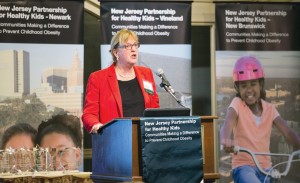Pediatrician concerned children are at risk for diabetes, hypertension, liver disease
December 10, 2015 | Community News and Media, Media Coverage, Statewide
Originally published in The Sentinel
A local pediatrician warned parents about the dangers of children facing the same diseases adults often are diagnosed with.

More than 300 New Jersey health stakeholders turned out to hear Dr. Sandra Hassink, president of the American Academy of Pediatrics, speak on healthier living for children at the Building a Culture of Health in New Jersey Conference in Edison on Dec. 2
Sandra G. Hassink, president of the American Academy of Pediatrics, spoke about “Childhood Obesity from the Perspective of a Pediatrician: Social Determinants of Health and Civil Rights Pertaining to Food Access and Physical Activity” during a program at the Pines Manor in Edison on Dec. 2.
“We can’t build a culture of health without raising the value of a child in our society,” Hassink said during the Robert Wood Johnson Foundation’s New Jersey Partnership for Healthy Kids’ (NJPHK) Building a Culture of Health in New Jersey Conference. “We need to change the framework of how we think about children. As a pediatrician, I would have never thought that I would treat children with such illnesses as type 2 diabetes, hypertension, liver disease and many others that were once only seen in middle-age adults.”
During the conference Hassink noted that obesity and under-nutrition co-exists today, creating a double burden.
“Today, the picture of food insecurity is increasingly an overweight or obese child consuming a poor-quality diet,” she said. “Limited resources and lack of access to healthy, affordable food stems from several things, including lack of full-service grocery stores and farmers markets, greater density of fast food and cost differentials between healthy and unhealthy food.”
Attended by more than 300 community leaders, government leaders, teachers, dieticians, social workers and school nurses, the conference focused on health care; policy and environment changes that better support children, family and community life; equity and opportunity; and private and public decision-making that impacts a com- munity’s overall health.
“More than 63 percent of adults and 23 percent of adolescents in New Jersey are overweight or obese,” stated Darrin Anderson, deputy director of NJPHK. “That’s why, more than ever, it’s important to continue empowering leaders to create the change needed to provide opportunities for families to make healthy choices – early on and throughout their lives.”
Over the past five years, NJPHK and its community partners have made great strides in implementing more than 100 environmental and policy changes to increase access to physical activity and healthy eating, including assisting with the development of school wellness policies, renovating playgrounds, installing bike lanes, partnering with more than 90 local corner stores to include healthier product offerings and launching healthy farmer’s markets in combination with health screenings.
SHARE:
Contact Us: 609-278-9622
Follow Us On: